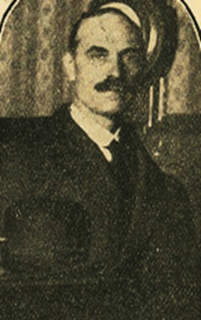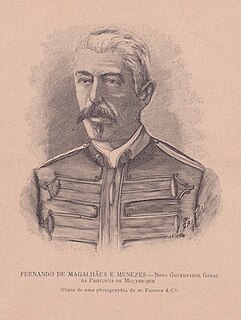
Praia, is the capital and largest city of Cape Verde, an island nation in the Atlantic Ocean west of Senegal. It lies on the southern coast of Santiago island in the Sotavento Islands group. It is the island's ferry port and is home to one of the nation's four international airports. The city centre is known as Plateau due to its location on a small plateau.

Tarrafal was a prison camp in the Portuguese colony of Cape Verde. The penal colony was established by the Portuguese dictator António de Oliveira Salazar following the outbreak of the Spanish Civil War in 1936. It housed opponents to Portugal's right-wing authoritarian regime. Due to the harsh conditions, at least 32 political prisoners died in the camp.

Nuno Craveiro Lopes was a Portuguese architect whose work includes projects in Mozambique and Angola from the colonial period. He was the son of Francisco Higino Craveiro Lopes, President of the Portuguese Republic, and Berta da Costa Ribeiro Artur. He married Albertina da Silveira Pinto of Rance and they had three children.
Events in the year 1890 in Portugal. There were 951,000 registered voters in the country.
Manuel António Martins was a Portuguese businessman and colonial governor of Cape Verde and Portuguese Guinea from 1834 to 1835. Martins was said to be the richest man in the country and nicknamed the Napoleon of the Cape Verde Islands. He arrived in Cape Verde in 1792. He started the exploitation of the salt ponds of Pedra de Lume on the island of Sal in 1796.
Domingos Correia Arouca was a Portuguese general, administrator and colonial governor of Cape Verde from 1835 to 1837, he was also a Portuguese politician and freemason.
João da Mata Chapuzet was a Portuguese colonial administrator and a military architect. He was colonial governor of Cape Verde, succeeding António Pusich on 16 January 1823. He was succeeded as governor by Caetano Procópio Godinho de Vasconcelos on 13 December 1826. Governor Chapuzet initiated the modernisation of the city of Praia.
Fortunato José Barreiros was a Portuguese colonial administrator and a military architect.

António Maria Barreiros ArrobasComA was a Portuguese colonial administrator.
João de Fontes Pereira de Melo was a Portuguese politician and a general in the 19th century. He was colonial governor of Cape Verde and Minister of the Maritime and Overseas.

Januário Correia de Almeida was a Portuguese colonial administrator, military engineer and a diplomat. He was created Baron of São Januário by King Luís I in 1866, Viscount of São Januário in 1867 and Count of São Januário in 1889. He was born in Paço de Arcos on 31 March 1829 as son of Januário Correia de Almeida and Bárbara Luísa dos Santos Pinto.
Augusto César Cardoso de Carvalho was a Portuguese colonial administrator and a general of the Portuguese Army. He was governor of Portuguese Timor from 1880 to 1881, governor-general of Portuguese India from 16 December 1886 until 27 April 1889 and governor of Cape Verde from 12 June 1889 until 4 February 1890.
Bernardo António da Costa de Sousa de Macedo was a Portuguese colonial administrator, a Vice-Admiral and a politician. He was a son of Luís António da Costa de Sousa de Macedo e Albuquerque, Count of Mesquitela, and Mariana Carolina da Mota e Silva. He was married to Maria Adelaide Pinto Barbosa Cardoso.

Abel Fontoura da Costa was a Portuguese colonial administrator, a military officer, a politician and a scientist.
Teófilo Duarte was a Portuguese colonial administrator, a military officer and a politician. He was a supporter of the Sidonist movement and the Estado Novo.

Fernando de Magalhães e Menezes. ComTE, CvC, CvA, OSE was a Portuguese colonial administrator and a military personnel, he was also Chief of Staff during the 31 January 1891 republican revolution.
Maximiano Alves was a Portuguese sculptor.
Sebastião Lopes de Calheiros e Meneses was a Portuguese colonial administrator. He was governor of Cape Verde and of Angola. He was born on 24 January 1816 in Geraz do Lima, northern Portugal. His father was Pedro Lopes de Calheiros e Meneses. He succeeded António Maria Barreiros Arrobas as governor of Cape Verde on 28 March 1858, and was succeeded by Januário Correia de Almeida in June 1860. He succeeded Carlos Augusto Franco as governor of Angola in February 1861, and was succeeded by José Baptista de Andrade in September 1862. He was Minister of Public Works in the government of Sá da Bandeira (1868-1869). He died in Viana do Castelo on 20 November 1899.
The following lists events that happened during 1958 in Cape Verde.
António Augusto Peixoto Correia was a Portuguese colonial administrator, military officer and politician. He was born 11 October 1913 in Vila Nova de Gaia, a suburb of Porto in northern Portugal. He was a navy officer, and was governor of the District of Huíla in Angola in 1955. Between 1957 and 1958, he was governor of Cape Verde. He succeeded Manuel Marques de Abrantes Amaral and was succeeded by Silvino Silvério Marques.







